- Home
- Steven Harper
The Doomsday Vault Page 13
The Doomsday Vault Read online
Page 13
“Good heavens,” Alice said at the bottom. Her voice echoed in a large space, but Click and his eye beams were too far ahead for Gavin to make out what she was looking at.
“What is it?” Gavin asked. “I can’t see anything.”
“I think there’s an electric light here,” she said.
Alice turned a switch just as Gavin arrived at the bottom. Lights blazed up, revealing an enormous room with ragged stone columns. Sprawled across the space lay a maze of worktables, equipment, glassware, bookshelves, and machinery.
And it had all been smashed.
The glassware lay in shards. Books were scattered across the floor. Flasks of chemicals had been shattered. Machines had been pulled apart. A wall safe had been broken open, the door left hanging by one hinge. Alice put a hand to her breast.
“This is awful,” she murmured.
“You don’t hear me arguing.” Gavin stepped carefully around a pile of broken glass.
“It makes me want to weep, Mr. Ennock,” Alice said. “I’ve always scraped along with secondhand tools in a tiny bedroom. Now look at this waste and wreckage. And I still don’t know what’s happened to my aunt.”
Gavin wanted to put an arm around her in comfort. She had lost her hat somewhere, and her honey brown hair was coming loose from a French twist, making her look forlorn. Her wide brown eyes complemented her triangular face and small nose. Despite being disheveled, she was beautiful, and strong, and fascinating. This woman knew what needed doing, and she seemed determined to do it. Hell, she had navigated that nightmare room of automatons before he had played them into silence and had faced down marauding mechanical gargoyles. He wasn’t sure he would have had the nerve.
“I know what you mean,” Gavin said. “Losing something important is hard.”
“Yes.” Alice slipped a handkerchief from her sleeve and dabbed at her eyes. “Well. Do you suppose whoever smashed all this also kidnapped or killed Aunt Edwina?”
“It’s possible,” Gavin said, “but the timing is a bit off. You said she stopped contacting her—what was the word? Solicitor?—several months ago, except I’ve been here for only a couple weeks. If your aunt Edwina is the Red Velvet Lady, that would mean she had those men grab me after she disappeared.”
“After she stopped contacting her solicitor, you mean,” she replied. “But yes, you’re correct. And we don’t know when this damage was done. Today? Last week? Last year? And is any of it related to that bloodstain near the front door? So many questions I don’t have the answers for. It’s maddening.”
“Let’s keep looking around,” Gavin said. “Though I don’t know what I’m looking for. I’m more of a musician than an engineer or mechanic.”
“You’re a very fine musician, too,” Alice said.
“Oh.” The compliment brought a warm feeling to Gavin’s chest, and he flashed Alice a smile. “Thanks.”
Alice seemed embarrassed, and she quickly turned to examine a pile of machinery. “That’s an unusual arrangement for a violin case, I have to say,” she said. “Don’t most players carry theirs by the handle?”
“Not on an airship,” he said. “You want both hands free.”
“You mentioned a ship,” Alice said. “I assumed you were a sailor. But you’re an airman.”
“Was,” he said. “Flying is the most wonderful profession in the whole damned world, pardon my language. You glide above the clouds and everything is fresh and fine and pure. You can see the whole world, and music carries a hundred miles.”
“How did you come to London, then?”
He told her while they poked through the wreckage of the laboratory, though he deliberately left out the part about Madoc Blue and his harsh hands. Blue still nipped and tore at Gavin’s clothes at night, and behind Blue stood the first mate with his heavy whip, and Gavin often woke up soaked in terror sweat. Even talking around it made his heart jerk. It was difficult enough to tell Alice about the deaths of Tom and Captain Naismith and the loss of the Juniper. As he spoke, his hand began to ache, and he realized his fist was clenched around the nightingale in his pocket, though the longer he spoke, the more he began to relax. It felt strangely good to tell someone else about it.
“I’m so sorry, Mr. Ennock,” she said when he finished. “Perhaps when we’re done here, we can find a way to get you back to Boston.”
Hope touched Gavin. After the pirates and clerk at Boston Shipping and Mail and the kidnappers, the idea that someone was willing to help him brought an unexpected lump to his throat.
Click meowed and batted at a pile of metal in a side niche. It was the shell of another automaton, painted black and white, as if it were wearing a butler’s coat. Two light-bulbs formed eyes, and a metal grate gave it a sort of mouth on an otherwise blank brass face. On a table beside it lay a jumble of parts—gears, pistons, wheels, and other bits Gavin didn’t understand. Click meowed again.
Alice came over to investigate. “What is it?”
The cat swiped at the automaton with metal claws.
“What’s that on its side?” Gavin said. “Looks like writing.”
They both leaned in. Inscribed on the torso in graceful script were the words Love, Aunt Edwina. Alice went pale.
“What is it?” Gavin asked, afraid she was going to faint.
“She wrote that on every one of the automatons she sent me. And look—there’s a diagram on the inside of his front panel.”
“What do we do?”
“Aunt Edwina meant me to find him. She assumed that her attackers wouldn’t notice him or wouldn’t know how he goes together. Clearly Aunt Edwina wanted me to assemble him so he could tell me more.”
“This is the same woman,” Gavin reminded her, “who imprisoned me in a tower and set deadly traps.”
“Yes,” Alice said. She picked up a wrench from a scattering of tools on the floor. “And I’m assuming she had reasons for all of that. The traps, for example, may have been set to keep out whoever destroyed this place.”
“They didn’t work.”
“Not everything goes as planned, Mr. Ennock. Hand me that spanner, would you?”
He did. “Let’s work out what happened so far, then. First, your aunt comes down with the clockwork plague, but instead of dying, she becomes a clockworker.”
“And she lives as a clockworker longer than any clockworker I’ve ever heard of.” Alice examined a gear, discarded it, picked up another.
“She vanishes—or seems to,” Gavin went on. “Which triggers a provision in her will that leaves you her estate. Does that make you a wealthy woman?”
“No.” Alice opened the back of the automaton’s head and peered inside. “The memory wheels seem to be intact. That’s helpful. The house isn’t inhabitable, as you can see, and it will take months, perhaps years, to sell the land. And since I’m not technically nobility yet, I will have to pay exorbitant taxes on the sale. Now that I think about it, I may have to pay taxes on it now.”
“You’re not technically nobility? What does that mean?”
“My father is a baron, but I won’t be a baroness until I inherit his title. And before you interrupt with the question you Americans always seem to ask, Mr. Ennock, there are no men in my family to inherit the title. In such a case, the daughter inherits. But until that happens, I’m not nobility, and I must pay taxes.”
Gavin stared. Alice was the daughter of a baron? “Incredible,” he whispered.
“What all of this means,” Alice continued, “is that I may have to pay an enormous inheritance tax on this estate, and Aunt Edwina’s solicitor was extremely lax in failing to mention it.”
“Uh, sorry I brought it up,” Gavin said, still impressed. “Anyway, your aunt disappears, leaving you an estate full of traps. Which brings us to the first question—why would she leave you a house that tried to kill you?”
“I said before that I don’t think she was trying to kill me,” Alice said. “I think she was trying to keep someone else out. It worked, but only for
a while—someone got down here. The traps didn’t keep me out, either, but they weren’t intended to. Aunt Edwina knew I would outsmart them.”
“She must have a lot of confidence in you,” Gavin said.
“Presumably.”
“In the meantime, she also had me kidnapped and put in that tower. Why?”
Alice unwound a coil of copper wire and snipped off a length. “I think she wanted me to let you out so you could help defeat the traps and help me take the house. It’s certainly what happened.”
“But why?”
“That I don’t know. Clockworkers do go mad. Now, where did I put that piston lubricant?”
Gavin watched her work, her movements confident and quick. She looked a little older than he was—somewhere in her early twenties—and he wanted to ask her exact age, but that would have been really rude, and he didn’t want to offend her. Hell, more than anything he wanted to impress her, but what would impress this woman?
“Uh... Miss Michaels?”
Alice had stuck her head into the automaton’s chest cavity. She withdrew and blinked at him. A bit of grease smudged her cheek. “Yes?”
“Er...” His entire face felt hot, and he realized he was blushing. Cursing himself for an idiot, he plunged ahead anyway. “Would you like some music while you work?”
She blinked at him again, and he looked away, scuffing the stone floor with one foot. What kind of fool would—
“I would love some music, Mr. Ennock. Do you know any Mozart? I find his music focuses my mind on mathematics.”
“Uh.. .”
“Something from The Marriage of Figaro, perhaps.” She hummed a few bars of a familiar tune.
“Oh, yeah—I know those songs. I didn’t know Mozart was the composer.” He set bow to strings and played. Despite the pain in his fingers, every note came out sweet and quick, like flavored ice on a summer day. Maybe it was the time he had spent in the tower with nothing to do but practice, but his playing seemed to have improved lately. He didn’t think he could have played that hellish song the automatons had laid out before he’d been captured.
Alice went back to work, and she seemed to be going even more quickly now. Gavin slipped from one song to the next, always keeping with Mozart, the famous clockworker composer, while Click watched. Their work melded, music and science melting together with every twist of Alice’s wrenches and every slide of Gavin’s bow. In what felt like very little time, Alice was tightening a final bolt on the automaton’s chest plate. She straightened, and Gavin heard her back pop even over “Open Your Eyes.” He stopped playing.
“Finished,” Alice said unnecessarily. “His Babbage engine is fully functional; his power sources are wound and charged. And your playing helped, Mr. Ennock. Really, you should play professionally.”
He thought about his time in Hyde Park. “I guess I have, in a way.” Then he realized she was praising him and that he had just possibly impressed her, and that made him flush again.
“Now we just switch him on.” Alice inserted a tool into the automaton’s left ear and twisted. The automaton twitched. Its eyes flickered, went out, then glowed steadily. Gavin felt an insane desire to shout, “Live!”
The automaton turned its head with a creak, apparently taking in its surroundings. It looked at Alice and said in a quiet, reedy voice, “Good evening, miss. My name is Kemp. What service do you require?”
“It works!” Gavin exclaimed.
“Of course it works,” Alice said. “Hello, Kemp. Do you know where you are?”
“I appear to be in Madam’s laboratory. And it is a frightful mess.”
“What is your function in this house?” Alice asked.
“I am Madam’s valet.”
“Isn’t a valet a manservant?”
“Madam has her own ideas about the way the world should run, miss. Might I ask who you are?”
“My name is Alice Michaels, daughter of Arthur, Baron Michaels. I am your mistress’s niece.”
“I see,” Kemp said. “There is extensive information about you in my memory wheels. But why are you here? Where is Madam?”
“What’s the last thing you remember, Kemp?”Alice asked.
Kemp’s eyes flickered. “Madam called me down to the laboratory. She ordered me to remain still. Then you were standing before me.”
“How long ago was this?”
“What is the date, miss?”
“May twenty-fourth,” she said, then added, “1857.”
Kemp’s eyes flickered again. “Oh my. I have been inactive for more than a year!”
“I’m sorry, Kemp,” Alice said. “Aunt Edwina vanished sometime ago. She left me this house and its contents in her will. This is Gavin Ennock. Did Aunt Edwina say anything about him before she deactivated you?”
“Code forty-seven delta,” Kemp said. “Code forty-seven delta. Active. Active.”
“What?” Gavin said.
Kemp swiveled his head left and right several times, then refocused on Alice. “According to the terms of Madam Edwina’s last will and testament and code forty-seven delta, everything in the house belongs to you, which means I am now your valet, Madam.”
“Oh!” Alice put a hand to her mouth. “Well. I suppose you are.”
“Love, Aunt Edwina,” Gavin put in.
“Tell me, then,” Alice said, “did Aunt Edwina say anything about capturing Mr. Ennock here or about her upcoming disappearance?”
“That information is not in my memory wheels, Madam. I am sorry.”
“Do you know who might have broken in here and destroyed the laboratory?”
“That information is not in my memory wheels, Madam. I am sorry. Would Madam care for something to eat or drink?”
Gavin’s stomach growled at that moment. “I would. What time is it?”
“After three in the morning,” Alice said, checking a watch in her handbag. “Good heavens, no wonder I’m so hungry. I didn’t even have supper.”
“Madam!” Kemp said. “You mustn’t neglect yourself so. I will return in moments.”
“I don’t know what you’ll find in the kitchen after a year, Kemp,” Alice said doubtfully as Kemp headed toward the stairs with stiff steps.
“Tins keep.” Kemp put his foot on the bottom step. “I regret that it won’t be the best meal, but I daresay it will—code one seventeen omega. Code one seventeen omega.”
“What was that one for?” Gavin demanded.
“Sixty seconds,” boomed Edwina’s voice. “Fifty-nine. Fifty-eight.”
“Oh dear,” Kemp said. “My attempt to leave the laboratory appears to have activated a destruction code.”
Gavin gave Alice a wild look. “I thought the traps in the house were all deactivated.”
“This one must have been separated from the rest. I don’t know everything.”
“Madam,” Kemp said, “we must leave immediately.” Before either Gavin or Alice could respond, Kemp flung Alice over his shoulder and skittered up the stairs. Gavin hurried to follow with Click on his heels. At the last moment, he snatched up his fiddle and Alice’s handbag.
“Put me down, you brass idiot!” Alice shrieked. “I can walk myself.”
“Forty-one. Forty.” Kemp was moving faster than a mechanical man should have been able. “I cannot obey, Madam. My program is quite clear.”
“Twenty-two. Twenty-one.”
They were at the cellar door. The house creaked. Beams groaned like an airship in a gale, and bits of plaster fell to the floor. Terror tightened Gavin’s stomach, and his heart pounded at the back of his throat. It wasn’t enough time to get out. Something snapped with a report louder than a hundred guns, and a section of ceiling crashed to the floor.
The ground rumbled beneath Gavin’s boots as they reached the front door. Kemp smashed it open with a metal fist. Ears back and all his claws out, Click bolted through the opening, the metal making scrabbling noises on the stones.
“Twelve seconds. Eleven. Ten.”
Outd
oors, they ran for it, though Kemp refused to pause long enough to put Alice on her feet. She stopped yelling, but her expression said there’d be hell to pay later. Edwina’s voice chased after them like a banshee.
“Four. Three.”
Kemp deposited Alice behind a low stone wall. Gavin dived behind it with Click, skinning his palms on dirt and gravel. They huddled there, plastered against hard rock.
“Zero.”
Gavin expected an explosion. Instead, there was a strange quiet. It rushed over them in a silent wave. This silence went beyond a simple lack of noise. This silence devoured all other sound and left behind an odd purity, as if Gavin’s soul had been scoured with sand and rinsed clean. Air rushed past him, blasting his hair. Gavin and Alice peeked over the wall just in time to see the manor house crumple inward and compress into a wrinkled mass like a schoolboy’s spitball. In less than a second it sucked into itself and vanished, all without the slightest sound.
Gavin clapped his hands and snapped his fingers, but heard no sound. He shouted at Alice, felt the tension in his throat, but heard no sound. Her mouth moved, but he heard nothing. She pointed at one ear and shook her head. For a horrible moment, Gavin was afraid he’d gone deaf. Kemp remained impassive. Then a bird called, and another, and another. A damp breeze rustled leaves in nearby trees. Kemp’s joints creaked. Gavin sighed with relief and heard the sound in his own ears. He offered Alice a hand up.
“What was that?” Gavin asked, never so relieved to hear the sound of his own voice.
But Alice was staring over the wall at the house, or the space it had occupied. The entire building, including the tower, was gone. In its place, a perfect half sphere had been carved into the ground, revealing layers of earth and stone. Gavin edged up to it and peered over the side. The bottom looked to be four or five stories down. It could have swallowed the Juniper with ease.
“Shit,” he whispered.

 The Importance of Being Kevin
The Importance of Being Kevin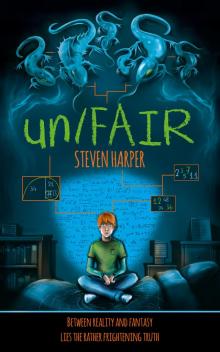 un/FAIR
un/FAIR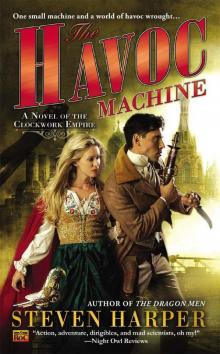 The Havoc Machine
The Havoc Machine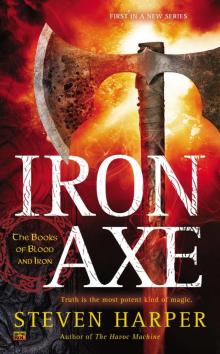 Iron Axe
Iron Axe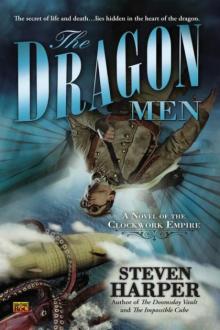 The Dragon Men
The Dragon Men The Doomsday Vault ce-1
The Doomsday Vault ce-1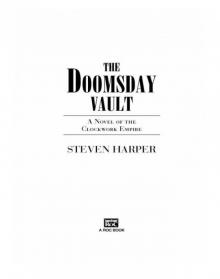 The Doomsday Vault
The Doomsday Vault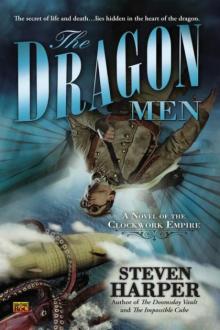 The Dragon Men ce-3
The Dragon Men ce-3 The Impossible Cube
The Impossible Cube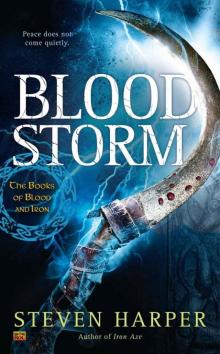 Blood Storm: The Books of Blood and Iron
Blood Storm: The Books of Blood and Iron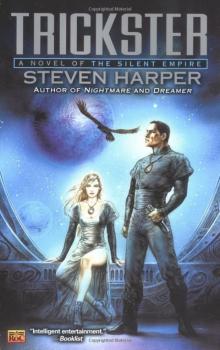 Trickster se-3
Trickster se-3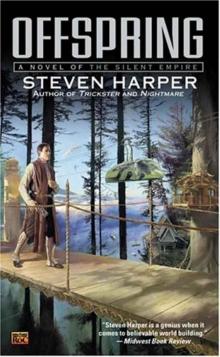 Offspring
Offspring Bone War
Bone War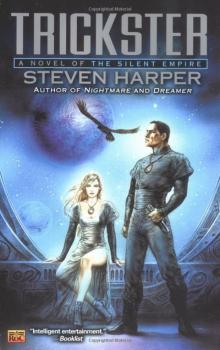 Trickster
Trickster Unity
Unity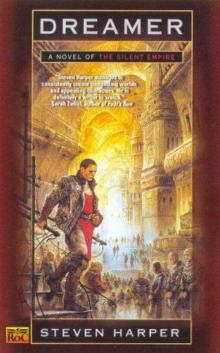 Dreamer
Dreamer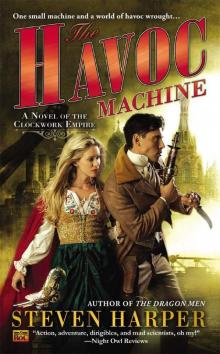 The Havoc Machine ce-4
The Havoc Machine ce-4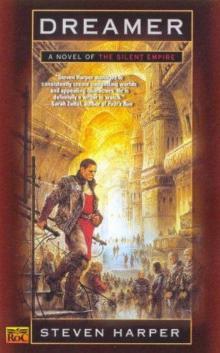 Dreamer se-2
Dreamer se-2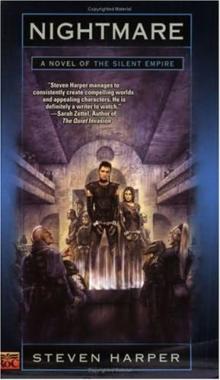 Nightmare se-2
Nightmare se-2